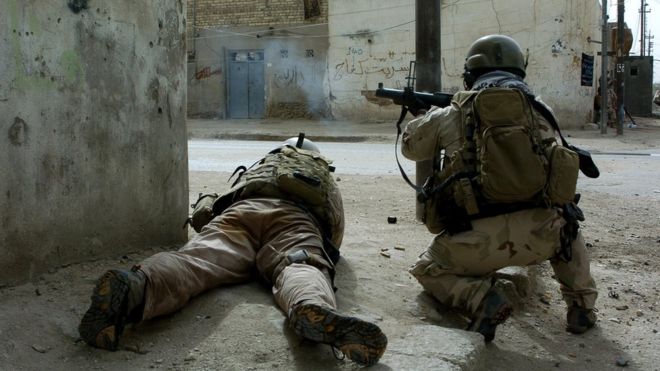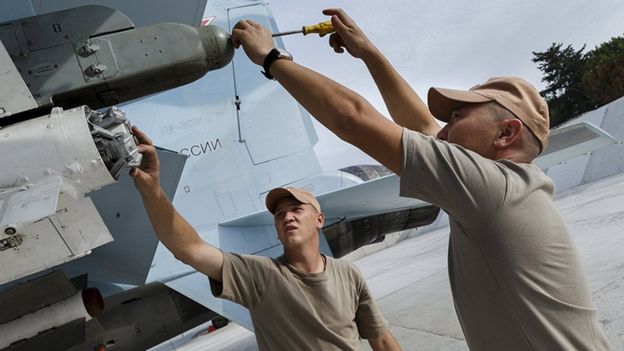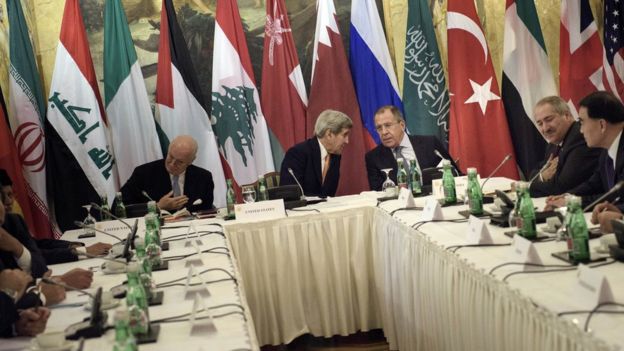Syria conflict: Russia warns US of ‘proxy war risk’

Russia has warned of the risk of a "proxy war" in the Middle East after the US said it would send special forces to Syria.
Russian Foreign Minister Sergei Lavrov said this increased the need for co-operation between the US and Russia.
US officials said "fewer than 50" troops would "train, advise and assist" vetted opposition forces in fighting the so-called Islamic State (IS).
It will be the first time that US troops operate openly in Syria.
Mr Lavrov said the US had decided on its move "unilaterally and without any reference to the Syrian leadership".
He added: "I am convinced that neither the United States nor Russia of course want any kind of slide into a so-called proxy war. But to me it is obvious that this situation makes the task of co-operation between the militaries even more relevant."
He was speaking after talks with US Secretary of State John Kerry and UN envoy for Syria Staffan de Mistura in Vienna.
"Our role fundamentally and the strategy is to enable local forces but does that put US forces in harm's way? It does, no question about it," Defence Secretary Ash Carter later told reporters.
He did not rule out further deployments of special forces to the region, if the initial mission was deemed a success.
For more than a year, US-led coalition forces have been carrying out air strikes against IS, which controls a large part of northern Syria and parts of neighbouring Iraq.
The US recently abandoned its Syria rebel training effort, opting to provide equipment and arms directly to rebel leaders instead.
White House spokesman Josh Earnest said President Obama wanted to provide additional support for Syrian rebel fighters who had been having success on the battlefield.
"There are now moderate opposition forces that are 45 miles (72km) outside [IS stronghold] Raqqa," he said. "The president is prepared to intensify the elements that have shown promise."
He added: "This is an intensification of a strategy he discussed a year ago."
Analysis — Jonathan Marcus, BBC defence correspondent
The numbers are small, nonetheless the US decision represents a notable shift in US policy. Their mission will be "to help co-ordinate local ground forces and coalition efforts" against IS in northern Syria. In all likelihood they may fight alongside Kurdish forces who have been the most effective of Washington's local allies.
"Co-ordination" could well mean forward air controllers — teams trained in the skills of linking up tactical air power with troops on the ground, designating targets and calling in strikes. The fact that the US now has specialised A-10 ground attack aircraft reasonably close by at the Turkish air base of Incirlik may also be significant.
This is a small step intended not least to reassure Washington's unsettled allies in the region. The drift in US policy has become even more apparent since Russia's muscular intervention from the air. But to be convincing, the US may need to do a good deal more and that seems to be at variance with President Obama's basic instincts.
This week's talks in Vienna involved Iran for the first time.
The summit sought to close the gap between the US and its allies, who support the rebels, and the key foreign allies of the Syrian government, Russia and Iran.
World leaders say progress was made in the "historic" talks to resolve Syria's civil war, but they continue to differ on the fate of President Bashar al-Assad.
Политика конфиденциальности | Правила пользования сайтом









